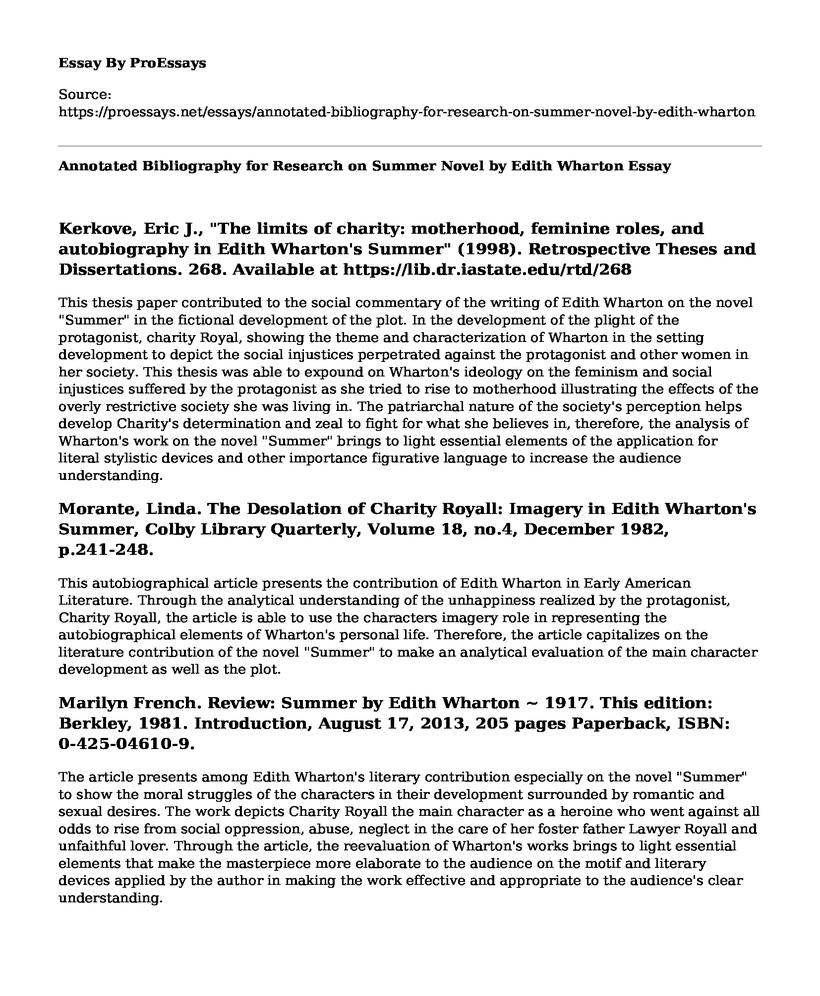Kerkove, Eric J., "The limits of charity: motherhood, feminine roles, and autobiography in Edith Wharton's Summer" (1998). Retrospective Theses and Dissertations. 268. Available at https://lib.dr.iastate.edu/rtd/268
This thesis paper contributed to the social commentary of the writing of Edith Wharton on the novel "Summer" in the fictional development of the plot. In the development of the plight of the protagonist, charity Royal, showing the theme and characterization of Wharton in the setting development to depict the social injustices perpetrated against the protagonist and other women in her society. This thesis was able to expound on Wharton's ideology on the feminism and social injustices suffered by the protagonist as she tried to rise to motherhood illustrating the effects of the overly restrictive society she was living in. The patriarchal nature of the society's perception helps develop Charity's determination and zeal to fight for what she believes in, therefore, the analysis of Wharton's work on the novel "Summer" brings to light essential elements of the application for literal stylistic devices and other importance figurative language to increase the audience understanding.
Morante, Linda. The Desolation of Charity Royall: Imagery in Edith Wharton's Summer, Colby Library Quarterly, Volume 18, no.4, December 1982, p.241-248.
This autobiographical article presents the contribution of Edith Wharton in Early American Literature. Through the analytical understanding of the unhappiness realized by the protagonist, Charity Royall, the article is able to use the characters imagery role in representing the autobiographical elements of Wharton's personal life. Therefore, the article capitalizes on the literature contribution of the novel "Summer" to make an analytical evaluation of the main character development as well as the plot.
Marilyn French. Review: Summer by Edith Wharton ~ 1917. This edition: Berkley, 1981. Introduction, August 17, 2013, 205 pages Paperback, ISBN: 0-425-04610-9.
The article presents among Edith Wharton's literary contribution especially on the novel "Summer" to show the moral struggles of the characters in their development surrounded by romantic and sexual desires. The work depicts Charity Royall the main character as a heroine who went against all odds to rise from social oppression, abuse, neglect in the care of her foster father Lawyer Royall and unfaithful lover. Through the article, the reevaluation of Wharton's works brings to light essential elements that make the masterpiece more elaborate to the audience on the motif and literary devices applied by the author in making the work effective and appropriate to the audience's clear understanding.
Works cited
French, Marilyn. Review: Summer by Edith Wharton ~ 1917. This edition: Berkley, 1981. Introduction, August 17, 2013, 205 pages Paperback, ISBN: 0-425-04610-9.
Kerkove, Eric J., "The limits of charity: motherhood, feminine roles, and autobiography in Edith Wharton's Summer" (1998). Retrospective Theses and Dissertations. 268. Available at https://lib.dr.iastate.edu/rtd/268
Morante, Linda. The Desolation of Charity Royall: Imagery in Edith Wharton's Summer, Colby Library Quarterly, Volume 18, no.4, December 1982, p.241-248.
Cite this page
Annotated Bibliography for Research on Summer Novel by Edith Wharton. (2022, Oct 20). Retrieved from https://proessays.net/essays/annotated-bibliography-for-research-on-summer-novel-by-edith-wharton
If you are the original author of this essay and no longer wish to have it published on the ProEssays website, please click below to request its removal:
- Character Analysis of Lily Owen in "The Secret Life of Bees"
- Literary Analysis Essay on Eve's Diary
- Don Quixote by Miguel De Cervantes Essay Example
- Marxist Criticism on Mary Shelley's Frankenstein Essay Example
- The Brave and Selfless Warrior: Hector of Troy - Essay Sample
- Essay Example on Odyssey: Homer's Captivating Masterpiece in Modern Times
- Essay Example on Vivid Description in Literature: Elizabeth & Melissa's Room in College







